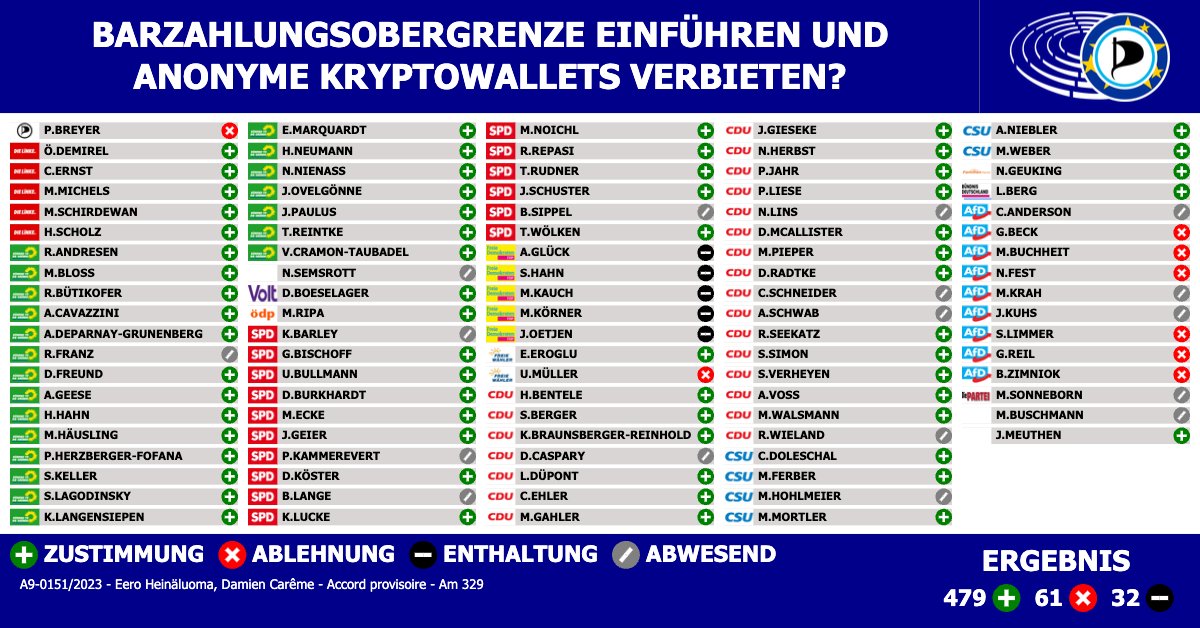EU Parliament votes in favor of new money laundering law
On March 19, 2024, the lead committees of the European Parliament voted by a large majority in favor of the new money laundering law, which restricts anonymous payments with cash and cryptocurrencies or prohibits them completely for certain institutions - Blocktrainer reported.
The plenary vote in the EU Parliament required for the new regulations, which was considered a formality, took place yesterday. The new law was approved by 479 votes (61 against and 32 abstentions). The new law was rejected by the German MEPs of the AfD and the Pirate Party. The FDP MEPs abstained unanimously. The majority of German MEPs from the other parties voted in favor of the new money laundering law.

The effects of the new law
The new law applies to certain institutions, the so-called "obliged entities". These initially include financial institutions, including crypto-asset service providers (CASPs) such as exchanges and brokers. These institutions must comply with standard procedures for identity verification (KYC) or anti-money laundering (AML), which have already been defined by other EU regulations and are already mandatory and part of common business practice (AMLD5, MiCA, TFR). In the context of combating crime, the new Anti-Money Laundering Act also applies to non-financial institutions such as soccer clubs or gambling services.
CASPs and self-hosted wallets
The new law once again expressly prohibits crypto brokers and exchanges from offering services for anonymous users, anonymous accounts or privacy coins. When interacting with self-hosted wallets, "risk-mitigating" measures (blockchain analysis, additional data collection) are now to be implemented in order to better track the flow of funds. This has been criticized by some MEPs, such as the Pirate Party MEP Dr. Patrick Breyer in his statement:
'Even online, we have a right to be able to pay and donate in cryptocurrencies without our payment behavior being recorded without cause and on a personal basis. The fact that the EU prohibits anonymous wallets for cryptocurrencies with providers (hosted wallets) without any threshold, while self-operated wallets remain anonymous, shows the pointlessness of these repressive laws.
Dr. Patrick Breyer, MEP for the Pirate Party
The law explicitly states that the regulations do not apply to providers of non-custodial or self-hosted wallets or other hardware and software. In addition, stricter approaches, such as limiting payments from a self-hosted wallet (without the involvement of CASPs) to 1,000 euros, were removed from the final version. Therefore, the law is not a ban on self-hosted wallets and P2P transactions. In future, it will still be possible to pay for goods and services in the EU with a self-hosted wallet without any restrictions. However, if you use a wallet provided by a service provider, the service provider may not allow anonymous crypto payments.
The impact of the new law on Bitcoin and other cryptocurrencies in the EU is therefore still limited. Rather, the new law will affect the use of cash.
Restriction on the use of cash
The new Money Laundering Act also limits cash payments to a maximum amount of 10,000 euros. Anonymous cash payments in business transactions are only permitted up to 3,000 euros. The individual EU member states can set the upper limit even lower. The ongoing restriction on the use of cash was understandably met with strong criticism by some ranks. Dr. Patrick Breyer put it in a nutshell in a commentary on the plenary vote:
Under the guise of combating money laundering, you are actually waging a war against cash, which has secured our financial privacy since time immemorial. They want to force our finances into a transparent and ever shaky banking system that can block our cards and accounts at any time and introduce negative interest rates. We will live to regret it. Let me tell you: Anyone who tampers with cash is tampering with our financial freedom. And for us Pirates it is quite clear: the finances of honest citizens are none of your business. Hands off our cash and our digital currencies! We Pirates say "no" to this creeping financial disenfranchisement.
Dr. Patrick Breyer, MEP for the Pirate Party
🇬🇧 The EU bans anonymous hosted crypto wallets and cash payments over €10,000. For #Pirates, it is clear that anyone who tampers with cash is tampering with our financial freedom.
Patrick Breyer #JoinMastodon (@echo_pbreyer) April 25, 2024
More on this in my plenary speech: pic.twitter.com/RbXoRu54bR-






